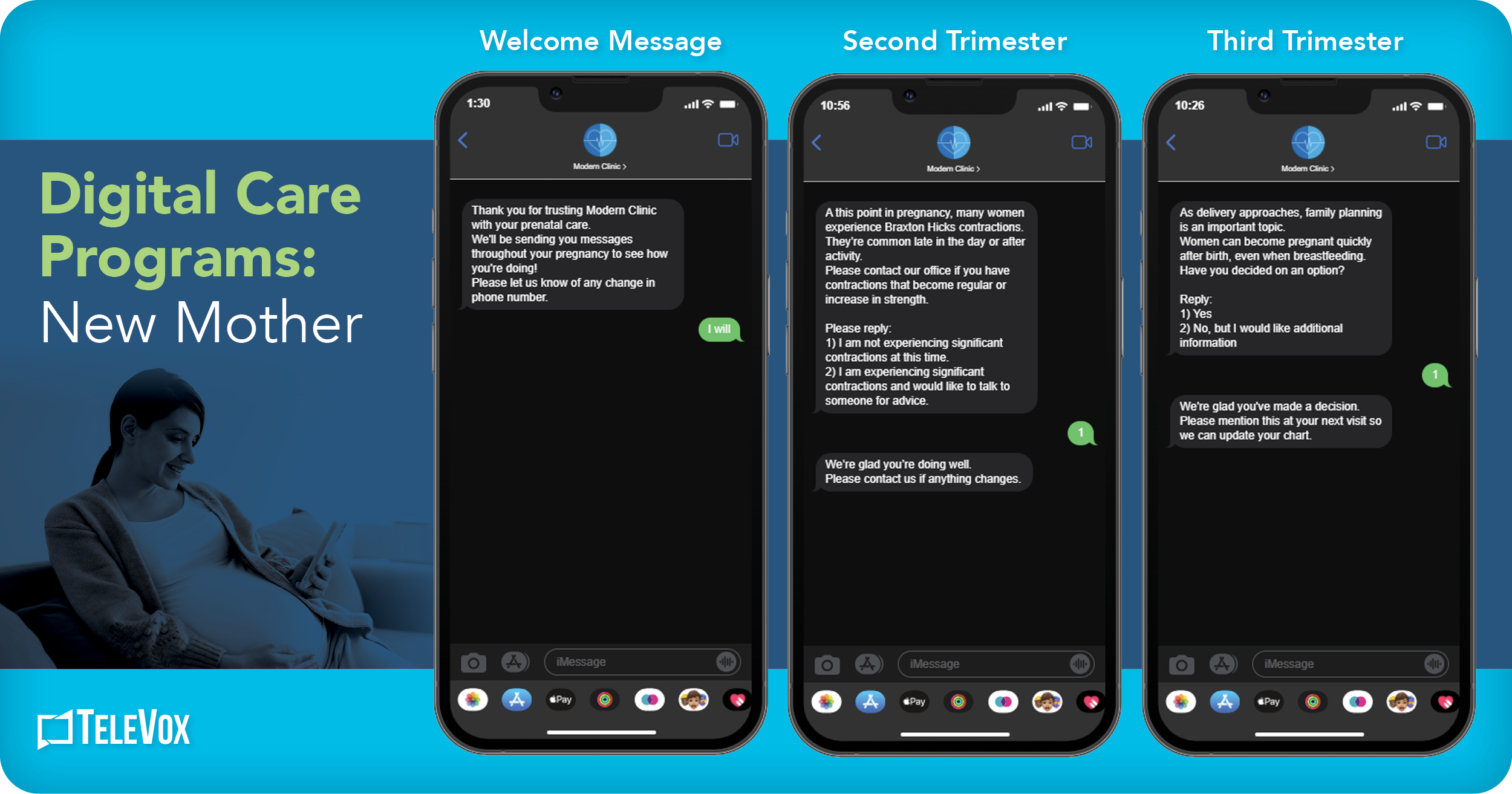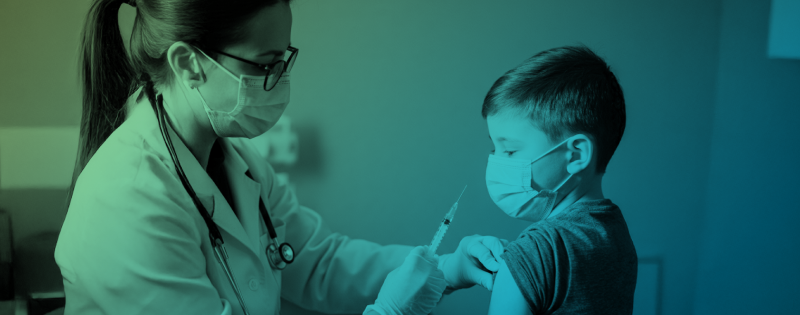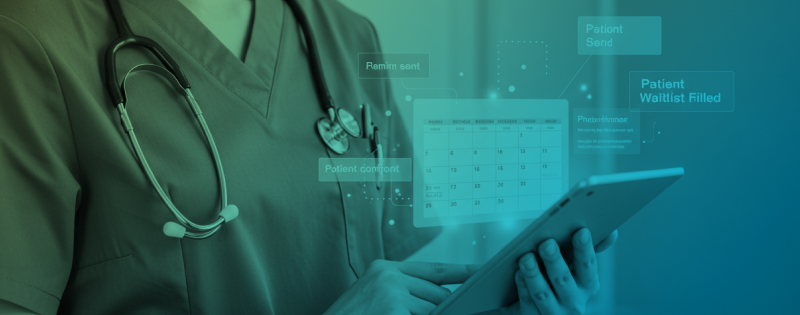Last flu season claimed the lives of more than 200 children in the United States,…

Televox Digital Care Programs: Enhancing Women’s Health with Advanced Technology
One of the main goals of the patient relationship management platforms we create at Televox is to promote better care outcomes for all. Televox’s Digital Care Programs are designed to address critical industry problem areas including patient education, transitional care, chronic disease management and health equity by offering automated, proactive guidance that bridges the quality-of-care gap.
In this next installment of the Women in Technology blog series, we’ll dive into how these digital patient programs help promote maternal health through critical education, support and accessibility for pregnant women and new moms.
The Benefits of Digital Maternal Patient Education
Among 55 studies assessing the effectiveness of digital maternal patient education for pregnant women, 38 (69 percent) reported significant patient outcomes, with the main benefits being increased knowledge (83.3 percent), emotional benefits (73.7 percent), and behavioral changes (60.6 percent).
Televox’s Digital Care Programs can provide education and support many facets of women’s health, including pregnancy-related issues like gestational diabetes and post-partum depression. They can support women through every phase of their pregnancy journey and provide a community of shared experiences for new moms.
This support and education are crucial, whether it’s an inexperienced first-time mom, an underprivileged patient without equal access to care, or a woman experiencing complications or concerns along her pregnancy journey. By offering helpful information and follow-ups during and after pregnancy, digital solutions can also serve as an important confidence boost to help women know they are not alone.

Improving Access Through Digital Care
Many people in the United States struggle to access the maternity care they need. March of Dimes reports that up to 6.9 million women in the U.S. are living in “maternity care deserts,” meaning patients have limited or no access to maternity health care services. In addition, over a quarter of U.S. women have to wait more than four weeks to see a specialist, which limits providers’ ability to address issues in a timely fashion and increases the probability of poor outcomes for both the mom and baby.
Large portions of the population are underserved due to factors ranging from healthcare staffing and technology gaps to geographical and financial barriers. For example, pregnant women in disadvantaged circumstances might struggle to make all the many appointments required along her pregnancy journey.
That’s where virtual care comes in: allowing people to receive the care they need, when and where they need it. Digital health can improve access to healthcare experts, such as OB-GYNs and mental health specialists, regardless of geography or office hours. It can fill in gaps for women who may not have local access to timely care during pregnancy, and it can also sustain support and care between in-person care appointments, driving improved outcomes.
According to a Deloitte survey, patients are using portals and mobile health apps most frequently across the pregnancy journey. Nearly half of respondents use digital tools to access care, with 49 percent using the tools to schedule appointments and 36 percent using them to communicate with their care team. 77 percent of respondents are using digital tools to monitor reproductive cycles, manage weight and nutrition, support mental health and educate themselves on maternal health.
Digital tools can help patients access care by providing patient portals, online scheduling, and communication tools for symptom monitoring. For example, Televox Digital Care Programs can automatically send text messages about common experiences at various trimesters and receive a report back from the patient about which ones she is feeling.
Promoting Equity and Empowering Women
The World Health Organization has also reported that digital health technologies can improve women’s health and promote equity. The benefits are primarily associated with improving access to health-care services, enhancing maternal health and providing essential health information.
The report found that that digital technologies allow women to gain more control over their health and feel more empowered. By facilitating access to information, support and healthcare services in a safe and private manner, digital solutions like Televox Digital Care Programs can help women increase their confidence and autonomy in all areas related to their health and well-being.
At Televox, we strive to contribute to health equity and better care outcomes for all. By harnessing the power of technology and innovation, we can continue to promote the highest level of maternal care and support for women’s health across the entire population.
About the Author

Donna Robinson
Donna Robinson has over 20 years of experience in the healthcare industry. As the Chief Commercial Officer at TeleVox, she plays a pivotal role in driving the company’s growth strategy. Donna is focused on helping to connect clients with TeleVox’s market leading patient relationship management platform, solving complex problems for healthcare providers, payers, and pharmaceutical organizations.
Donna is a true advocate for a purpose-driven culture and is known for empowering her team to provide exceptional client experiences. Prior to joining TeleVox, she held the position of Senior Vice President at Optum Insights (formerly Change Healthcare). Her track record includes 15 years at Spok, where she led teams in client engagement, strategy, solution consulting, and strategic partnerships as the Division Vice President.
With a strong commitment to transforming healthcare, Donna is passionate about enhancing the healthcare experience for the entire ecosystem. Her expertise lies in delivering results and fostering high-performing teams. Apart from her professional experience, Donna holds a Bachelor of Arts degree from the College of Santa Fe and a Master of Fine Arts from RADA.
In addition to her professional endeavors, Donna serves as a board member for the American Heart Association and Houston Christian University, further demonstrating her dedication to making a positive impact in the healthcare industry and the community.



